Embracing the Mediterranean diet has long been celebrated for its potential health benefits, which include supporting heart health and aiding in weight management. Integrating olive oil—a hallmark of this dietary pattern—provides a rich source of monounsaturated fats, known for their role in maintaining healthy cholesterol levels. For individuals with gluten sensitivities or celiac disease, following a gluten-free Mediterranean diet hinges on avoiding wheat, barley, and rye while still enjoying the wide array of foods and flavors characteristic of this region’s cuisine.

Olive oil is a cornerstone of the Mediterranean diet, valued not only for its flavor but also its nutritional profile. It serves as a healthy fat choice in cooking, dressings, and even some baking. Those following a gluten-free diet can easily incorporate olive oil into their meals, ensuring they consume fats that are beneficial rather than detrimental to their health. The variety of foods within the gluten-free Mediterranean diet is vast, including fresh fruits and vegetables, legumes, nuts, seeds, and gluten-free grains, as well as fresh seafood and moderate amounts of poultry and dairy.
Key Takeaways
- The Mediterranean diet supplemented with olive oil can promote heart health and support weight management.
- Olive oil is an essential fat source in the gluten-free Mediterranean diet, offering versatility and nutritional benefits.
- A gluten-free Mediterranean diet includes a broad spectrum of foods, ensuring a diverse intake of nutrients.
Table of Contents
Understanding the Gluten-Free Mediterranean Diet

The Gluten-Free Mediterranean Diet seamlessly incorporates the bountiful benefits of the traditional Mediterranean diet while strictly excluding all sources of gluten. This adaptation proves essential for individuals with celiac disease, ensuring they can relish the diet’s celebrated advantages without health compromises.
Core Principles of the Mediterranean Diet
The Mediterranean Diet emphasizes a rich palette of plant-based foods, including fruits, vegetables, legumes, and nuts. Healthy fats such as olive oil are pivotal, replacing less heart-healthy oils. Traditional whole grains form a foundation; however, in a gluten-free variant, these grains are carefully selected to avoid gluten. Seafood, particularly from the Mediterranean Sea, plays a crucial role, recommended at least twice per week.
Adapting to a Gluten-Free Lifestyle
Transitioning to a gluten-free lifestyle necessitates the avoidance of gluten-containing grains such as wheat, barley, and rye. Oats are often included but should be certified gluten-free due to cross-contamination risks. A dietitian can assist in identifying safe whole grains like quinoa and millet that harmonize with the Mediterranean ethos.
Benefits of a Gluten-Free Diet for Celiac Disease
For those with celiac disease, adherence to a gluten-free diet is not a choice but a medical necessity. A gluten-free Mediterranean diet offers a nutritionally balanced approach that can reduce inflammation and promote gut healing, key to managing celiac symptoms. Moreover, it has the potential to support heart health and maintain overall wellness, reflecting the core benefits of its traditional counterpart.
Olive Oil as a Staple Fat Source
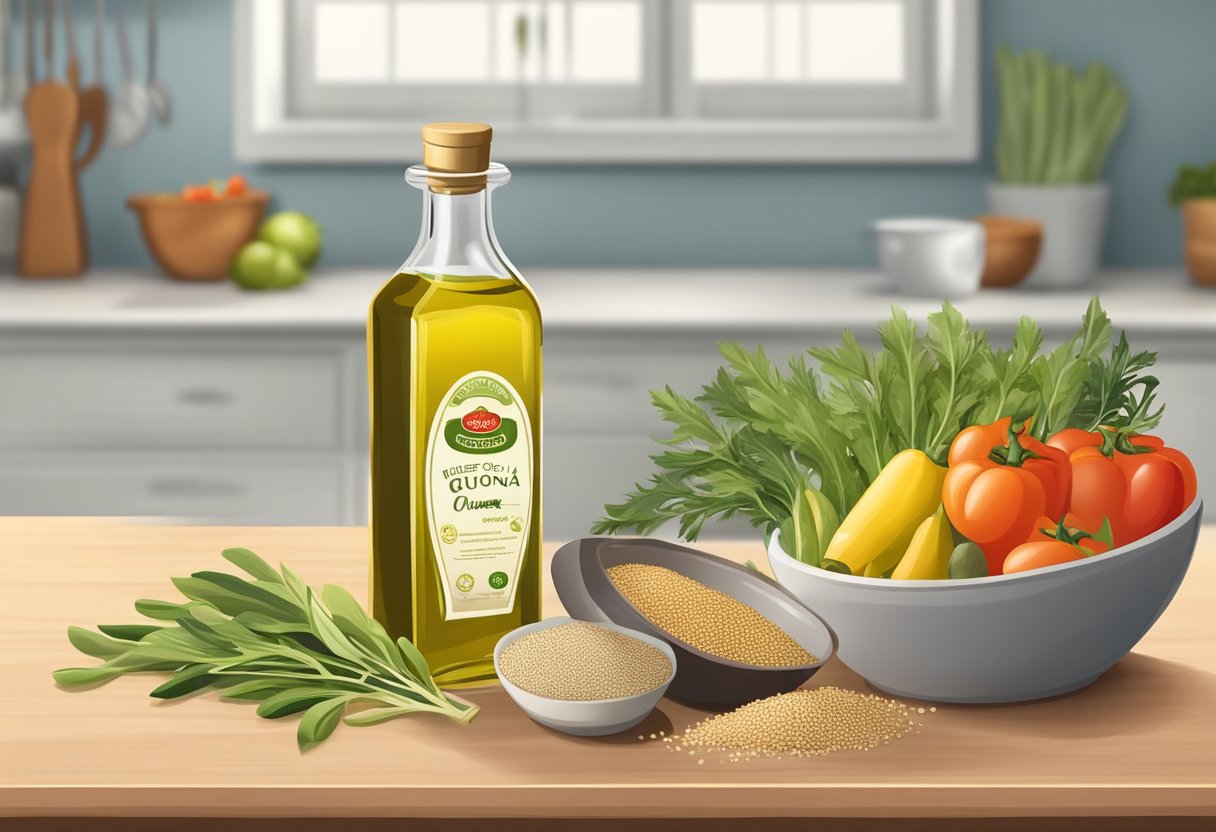
In the context of a gluten-free Mediterranean diet, olive oil reigns as the cornerstone fat source. As an indispensable ingredient, it balances taste with nutritional benefits.
Extra Virgin Olive Oil vs. Virgin Olive Oil
Extra Virgin Olive Oil (EVOO) is the highest quality olive oil, extracted from olives without the use of heat or chemicals. It’s known for its purity, superior taste, and lower acidity, typically below 0.8%. On the other hand, Virgin Olive Oil is also a first-press oil but may possess a slightly higher acidity level, usually under 2%, and a less robust flavor than EVOO.
Health Benefits of Olive Oil
Olive oil is celebrated for its health benefits. Rich in monounsaturated fats, it helps in lowering bad cholesterol levels and reducing the risk of heart disease. Unlike saturated fats, which should be consumed in moderation, the fat in olive oil promotes heart health when used as the main dietary fat.
Incorporating Olive Oil into Your Diet
Integrating olive oil into a gluten-free Mediterranean diet is straightforward. Use it as a dressing for salads, a healthier alternative for cooking, or a dip for fresh vegetables. The recommended approach is to replace saturated fats with olive oil, incorporating it in moderation to maintain a balanced diet.
Food Selections and Substitutions
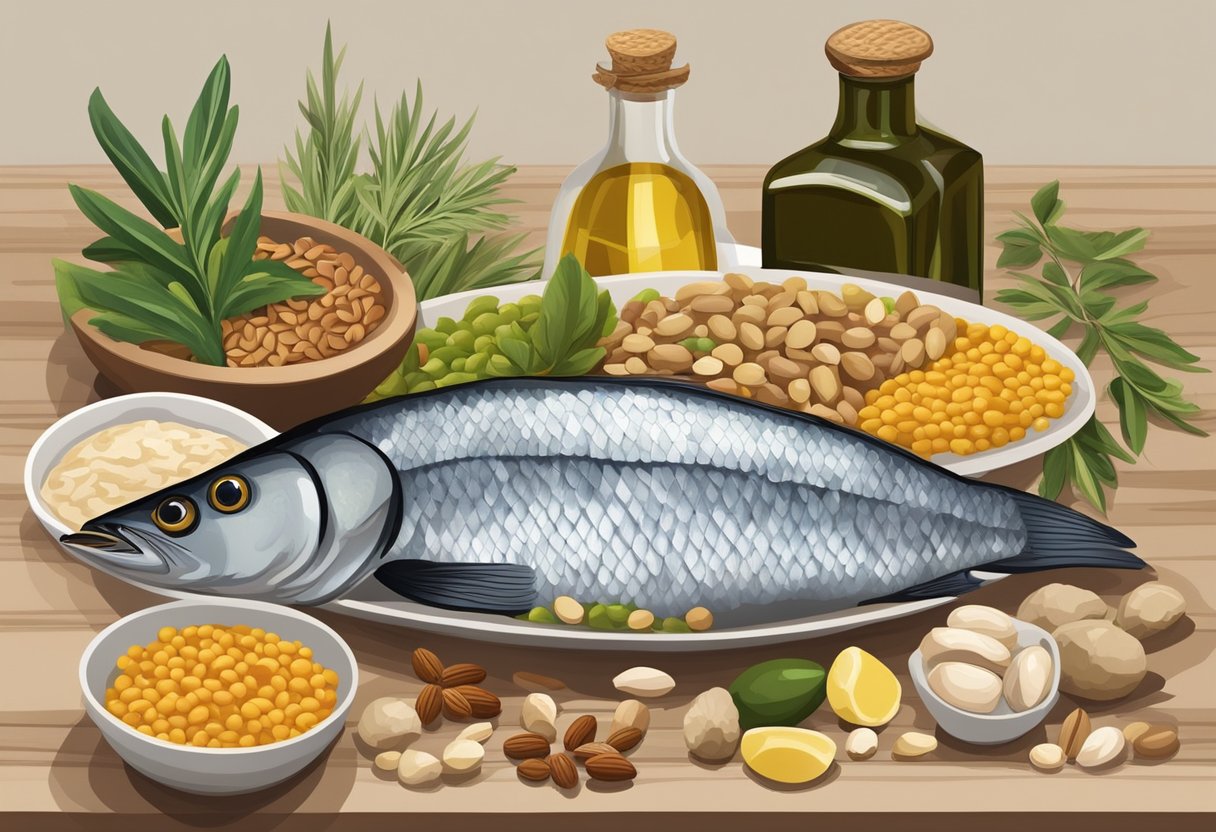
Making informed food selections and substitutions is critical for adhering to a gluten-free Mediterranean diet. This section covers specific choices within grains, fruits and vegetables, and alternatives to nuts, seeds, and dairy products.
Choosing Gluten-Free Grains and Legumes
Grains and legumes form the base of the Mediterranean diet and are important sources of fiber and protein. One must opt for gluten-free grains such as quinoa, brown rice, or buckwheat. Including legumes like lentils, chickpeas, and beans, which are naturally gluten-free, is essential for their high fiber content and to provide variety in meals.
Selecting Fruits and Vegetables
A diverse array of fruits and vegetables should be consumed daily. Aim to include leafy greens, bell peppers, and avocados for their high nutrient density. Snack on fresh fruit such as apples, berries, and citrus fruits, focusing on what is in season for optimal taste and nutritional value.
Nuts, Seeds, and Dairy Alternatives
Incorporate a variety of nuts like almonds, walnuts, and pistachios, which provide healthy fats and vitamins. Seeds such as flaxseeds, chia, and pumpkin seeds are also beneficial. When it comes to dairy, select gluten-free options like Greek yogurt and cheese made from goat’s milk or sheep’s milk. Non-dairy alternatives, especially those fortified with calcium and vitamin D, should be chosen when traditional dairy is not suitable.
Protein Sources in the Gluten-Free Mediterranean Diet

The gluten-free Mediterranean diet is rich in a variety of protein sources, ranging from fish and seafood, which provide both protein and essential omega-3 fatty acids, to poultry and red meats, consumed in moderation. For those following a vegetarian lifestyle or seeking alternative sources of protein, options abound in legumes and other plant-based foods.
Fish and Seafood Varieties
Fish and seafood are staple protein sources in the Mediterranean diet. Salmon, often highlighted for its high omega-3 content and associated health benefits, can be enjoyed grilled, baked, or poached. Shrimp offer a versatile and lean protein choice, suitable for a quick sauté or as part of a seafood medley. These seafood options should typically be included twice a week.
- Salmon: A 3-ounce serving typically contains around 22 grams of protein.
- Shrimp: One serving (about 3 ounces) contains approximately 18 grams of protein.
Poultry and Red Meat in Moderation
While the focus of the diet is mainly on fish and vegetables, poultry is included for those who prefer land-based proteins. Chicken and turkey are considered leaner options. Red meats, which comprise beef and lamb, are consumed less frequently but still provide high-quality protein when enjoyed in moderation.
- Chicken: Roughly 3 ounces of cooked chicken breast offer about 26 grams of protein.
- Red meats: A similar 3-ounce serving of lean beef cut can have up to 25 grams of protein.
Vegetarian Protein Alternatives
Individuals following this diet also have a plethora of vegetarian protein options. Legumes, such as chickpeas and lentils, not only contribute to protein intake but also provide dietary fiber and other nutrients. Eggs are an additional protein-rich food easily incorporated into a gluten-free Mediterranean diet.
- Chickpeas: One cup of cooked chickpeas contains approximately 15 grams of protein.
- Lentils: In one cup of cooked lentils, there are about 18 grams of protein.
- Eggs: One large egg holds about 6 grams of protein, making it a good choice for breakfast or as part of other dishes.
Understanding Fats and Sugars
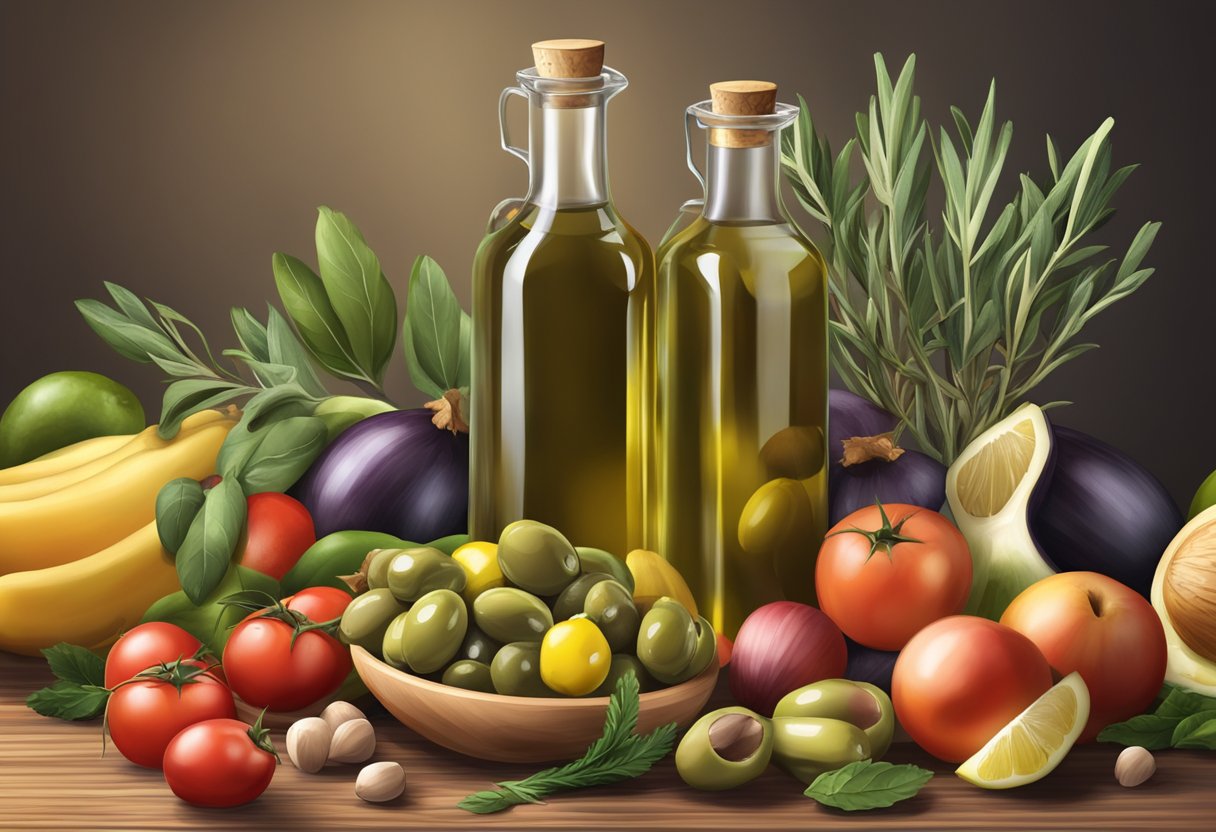
In the gluten-free Mediterranean diet, the quality and type of fats and sugars consumed are pivotal. This section navigates through the types of fats, the role of sugars, and dairy consumption within this nutritional framework.
Healthy Fats Versus Saturated Fats
The gluten-free Mediterranean diet emphasizes the importance of healthy fats, primarily found in olive oil, nuts, and avocados. These sources provide monounsaturated fats, which are beneficial for heart health. Conversely, saturated fats, typically found in animal products, should be limited. Saturated fats can contribute to higher cholesterol levels and are often found in higher quantities in processed foods.
Role of Sugars and Sweeteners
While sugar is not entirely off-limits, its intake should be low in the gluten-free Mediterranean diet. Honey can serve as a natural sweetener sparingly. Refined sugars and sweets are to be consumed in moderation, as they offer little nutritional benefit and can lead to energy fluctuations and weight gain.
Moderating Cheese and Dairy Intake
Cheese and other dairy products play a role in the gluten-free Mediterranean diet but should be enjoyed in moderation. They provide calcium and protein; however, choosing low-fat options helps maintain the balance of reducing saturated fat intake. Dairy intake should be thoughtful, focusing on quality and portion sizes.
The Role of Beverages
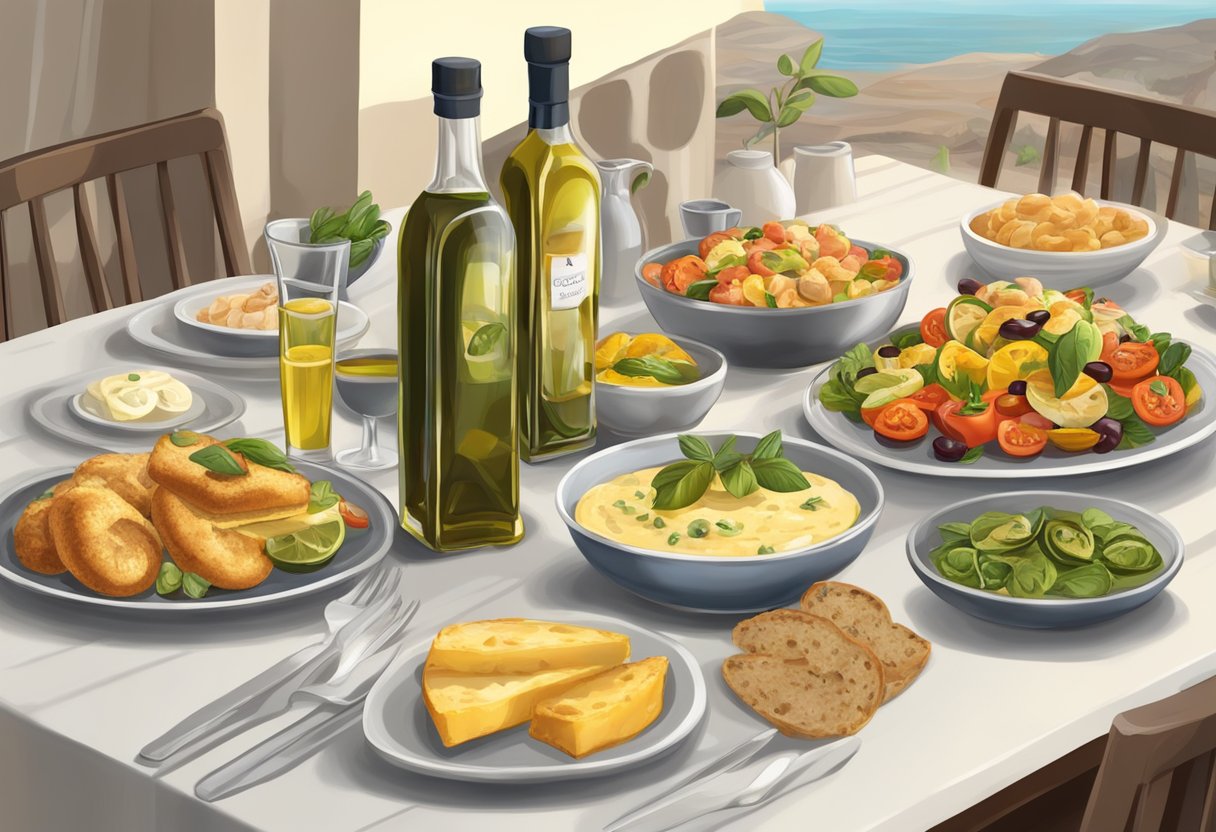
Beverages play a significant role in the gluten-free Mediterranean diet, complementing the nutritional profile and enhancing the overall dining experience. Within this framework, understanding the place of various drink options—alcoholic, hydrating, or otherwise—is essential.
Alcoholic Beverages in the Diet
While moderate consumption of alcoholic beverages is sometimes included in the diet, red wine is particularly favored due to its association with heart health when consumed responsibly. It should be noted that individuals should opt for gluten-free versions of alcoholic beverages, such as wine derived from grapes instead of barley-based products, which contain gluten.
Importance of Water and Hydration
Water is a cornerstone for staying hydrated and is encouraged as the main beverage within the gluten-free Mediterranean diet. It aids digestion, supports metabolism, and helps in the absorption of the rich array of nutrients found in the diet’s staple foods.
Tea, Coffee, and Non-Alcoholic Options
Herbal tea and coffee, when consumed in moderation and without gluten-containing additives, are suitable non-alcoholic beverage choices. They offer a variety of antioxidants and can be part of a balanced diet. These beverages should be enjoyed simply, without added syrups or creams that could potentially contain gluten.
Seasoning and Flavoring With Herbs and Spices
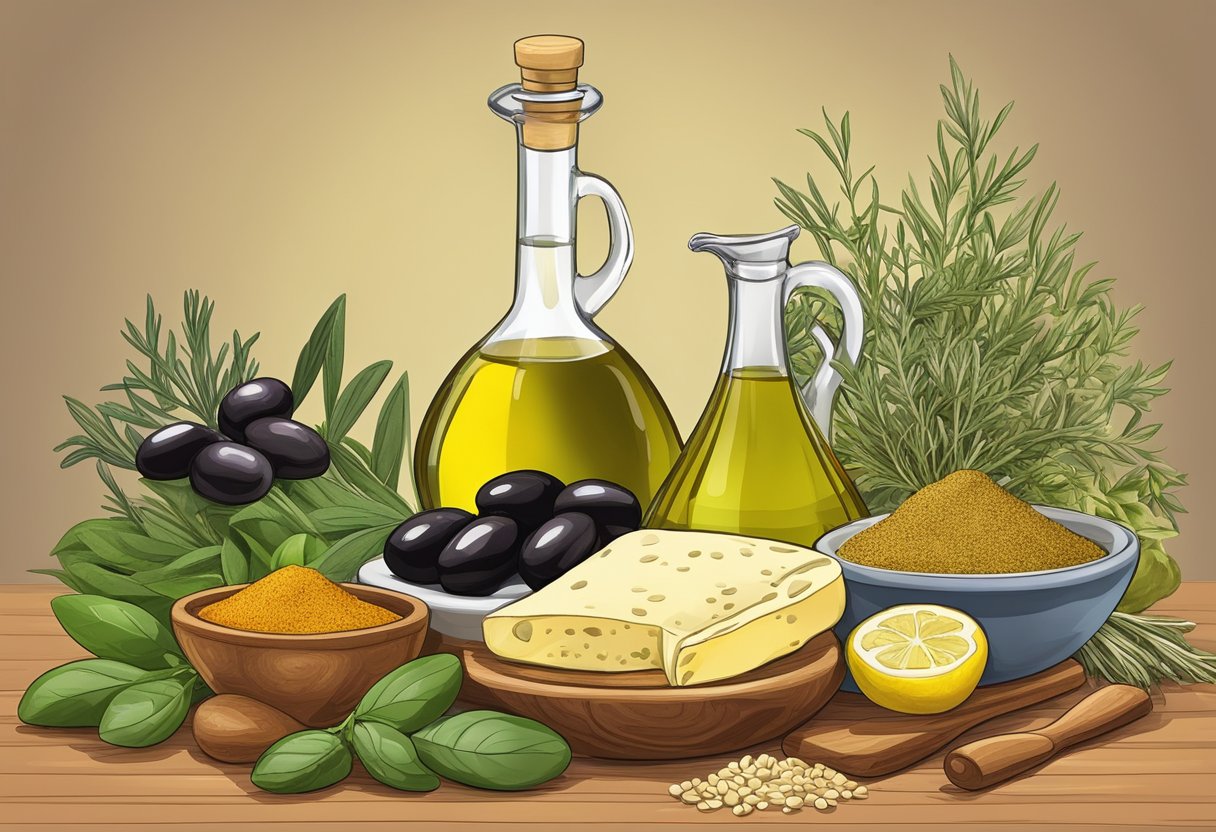
A gluten-free Mediterranean diet thrives on the rich flavors of natural herbs and spices. These enhancers not only impart tantalizing aromas and tastes but also avoid gluten, making them safe for individuals with dietary restrictions.
Incorporating Mediterranean Herbs
Mediterranean herbs such as parsley, basil, and rosemary are staples in flavoring dishes while adhering to a gluten-free diet. They can be used fresh for brighter notes or dried for a more concentrated flavor. For example, parsley provides a fresh, clean taste to salads and soups, while basil adds a sweet, peppery layer to sauces and marinades. When selecting herbs, one should ensure they are free from cross-contamination to maintain a strict gluten-free diet.
Gluten-Free Spices and Flavor Enhancers
To further elevate gluten-free Mediterranean dishes, spices and various flavor enhancers play a crucial role. Garlic powder is a versatile spice that adds warmth and depth to a myriad of recipes and can be found in a pure form without additives that contain gluten. Similarly, lemon juice and balsamic vinegar are gluten-free options that add a zesty or sweet tanginess, working particularly well with olive oil-based dressings. When purchasing spices, always check for gluten-free labeling to prevent the risk of cross-contamination.
Desserts and Treats in Moderation

The gluten-free Mediterranean diet allows for desserts and treats, though emphasis is placed on their natural and unrefined qualities. Such desserts focus on incorporating fruits, honey, and nuts while avoiding gluten-containing ingredients.
Healthy Mediterranean Dessert Options
The Mediterranean diet celebrates sweets that are not only delicious but also incorporate nutritious ingredients. Fruits and berries, for example, are commonly used. A classic dessert option includes Balsamic Berries with Honey Yogurt, where mixed berries are marinated in balsamic vinegar and topped with yogurt sweetened with honey.
Another healthy dessert on this diet could be a Chocolate Olive Oil Cake, made with gluten-free flour to keep it within dietary needs. This cake leverages the natural flavors and moisture from olive oil, paired often with a sprinkle of toasted hazelnuts for added texture and flavor.
Gluten-Free Sweeteners and Alternatives
When it comes to sweetening desserts on a gluten-free Mediterranean diet, natural options are preferred. Honey is a staple, used as both a sweetener and flavor enhancer due to its natural origins and health benefits. Here’s an example of gluten-free sweeteners that suit this diet:
- Honey: For sweetening cakes, drizzling over fruits, or blending into yogurt
- Pureed fruits: To naturally sweeten and add moisture to baked goods
- Nuts: Almonds, walnuts, and hazelnuts for additional texture and natural oils
A variety of gluten-free flours derived from almonds, coconut, or chickpeas can serve as flour alternatives for cakes, cookies, and other baked desserts. These flours not only align with the gluten-free requirement but also add unique flavors and are typically more nutrient-dense than white flour.
Planning Your Meals
Incorporating olive oil into a gluten-free Mediterranean diet requires mindful planning to ensure meals are nutritionally balanced and rich in variety. An effective meal plan can provide structure while offering flexibility to enjoy a range of flavors and textures.
Creating a Balanced Meal Plan
When constructing a gluten-free Mediterranean diet meal plan, it’s essential to include a diverse array of foods that provide essential nutrients without gluten. Olive oil serves as the cornerstone of added fats due to its heart-healthy monounsaturated fats. Each meal should consist of:
- Fruits and vegetables: A colorful selection ensures a wide range of vitamins, minerals, and fiber.
- Lean proteins: Options like chicken, fish, and legumes provide important protein without gluten.
- Gluten-free grains: Quinoa, rice, and oats are safe choices that complement the Mediterranean palate.
- Healthy fats: Beyond olive oil, nuts, seeds, and avocados provide additional healthy fats.
Ideas for Gluten-Free Mediterranean Recipes
A well-planned gluten-free Mediterranean diet is incomplete without a repertoire of recipes to bring it to life. Here are some recipe ideas:
Breakfast:
- Quinoa porridge with almond milk, topped with fresh berries and a drizzle of olive oil.
Lunch:
- Grilled chicken salad with mixed greens, cherry tomatoes, olives, and a vinaigrette made with olive oil.
Dinner:
- Baked salmon with a side of grilled asparagus, both finished with a generous splash of olive oil.
For more detailed recipe ideas, one can find inspiration from resources like this 7 Day Gluten-Free Mediterranean Meal Plan, which includes a range of recipes suitable for all meals.
Remember, these meal and recipe strategies are adaptable to personal preference and can be modified to fit any gluten-free Mediterranean diet lifestyle.
Frequently Asked Questions
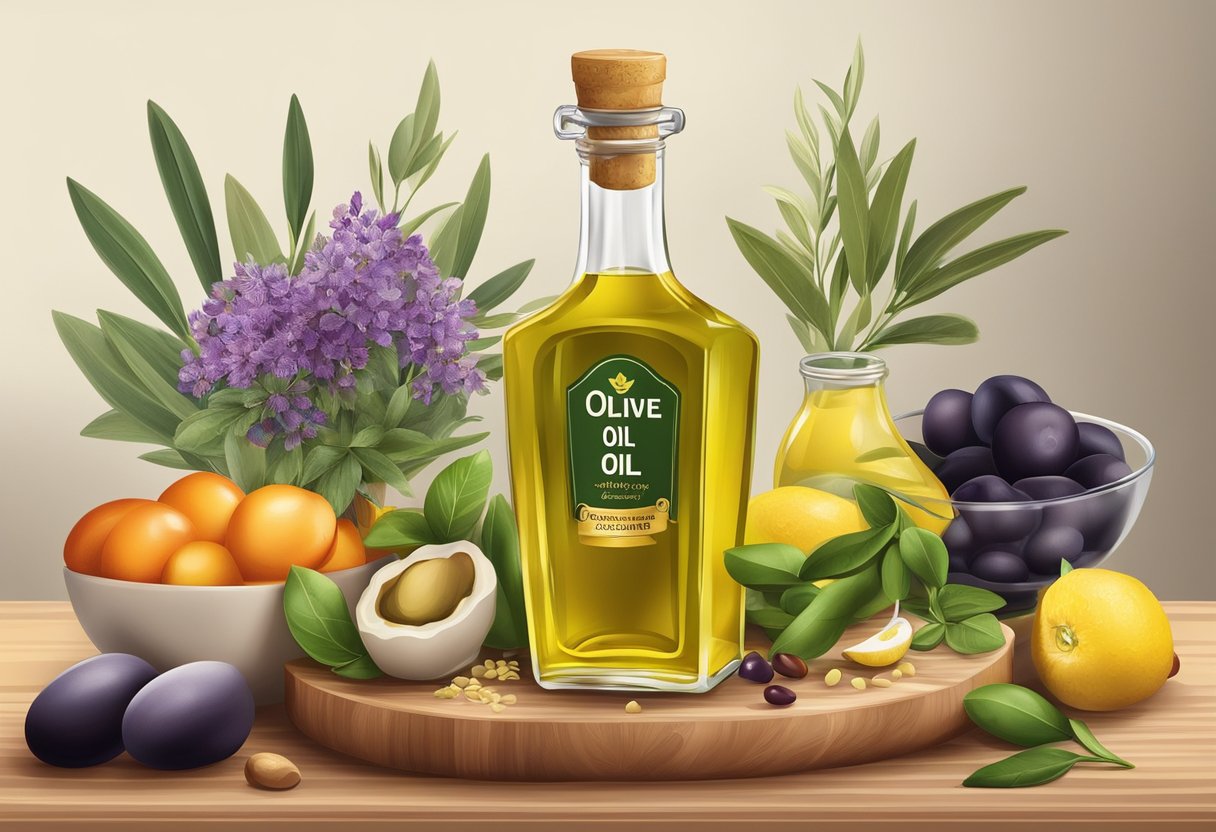
In this section, readers can find concise answers to common inquiries regarding a gluten-free Mediterranean diet, including meal ideas, ingredients, dining out, and resources for recipes.
What foods are included in a gluten-free Mediterranean diet?
A gluten-free Mediterranean diet is rich in fruits, vegetables, legumes, nuts, seeds, and healthy fats such as olive oil and avocado. It also includes seafood and poultry, while red meat and sweets are limited.
Where can I find gluten-free Mediterranean diet meal plans?
The Celiac Disease Foundation provides a 7-day gluten-free Mediterranean diet meal plan that is accessible online and caters to dietary restrictions associated with celiac disease.
How can I ensure I’m buying gluten-free ingredients for a Mediterranean diet?
When purchasing ingredients, one should check labels to confirm they are certified gluten-free. Products such as olive oil are naturally gluten-free, but it is always prudent to validate there is no cross-contamination with gluten-containing substances.
Are there any recommended cookbooks for gluten-free Mediterranean recipes?
Although specific cookbooks are not listed here, there are many cookbooks available that focus on gluten-free Mediterranean cooking. They often offer a variety of recipes that cater to both dietary restrictions and the nutritional benefits of the diet.
What are some gluten-free Mediterranean breakfast options?
For breakfast, gluten-free options within the Mediterranean diet might include Greek yogurt with fruit, frittatas with vegetables, or smoothies that incorporate leafy greens and nuts.
Can I dine out while following a gluten-free Mediterranean diet, and how?
One can dine out on a gluten-free Mediterranean diet by choosing restaurants that offer gluten-free menus or are knowledgeable about gluten sensitivity. It’s important to inform servers of dietary restrictions and inquire about dish ingredients and preparation methods.



